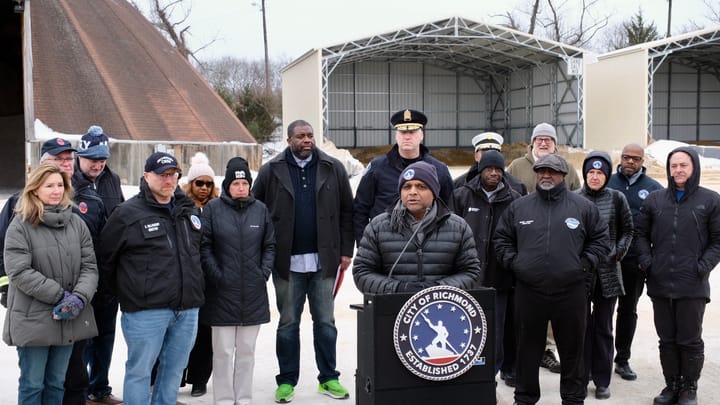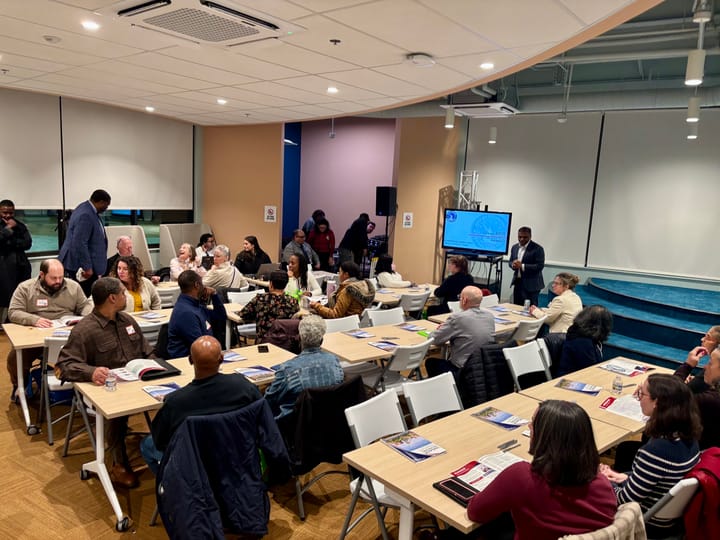
Council OKs new restrictions on vape shops, tougher rules on city residency
The Richmond City Council voted Monday to approve new restrictions on vape shops that will prevent new tobacco and hemp retailers from opening in most of the city.
The Council also passed new rules meant to encourage high-ranking city officials to live in Richmond instead of commuting from nearby counties.
The Council took final action on several long-pending proposals at the last meeting before its August recess, but other big-ticket items will still be waiting when the body returns in September.
A plan to establish a rental inspection program with an eye toward improving living conditions for low-income tenants was continued until the Council’s Sept. 22 meeting, as was a proposal to reform the city’s budget process to give the Council more input into the city’s spending priorities.
Vape shops
The vape shop ordinance was initially set to be pushed back too, but Councilor Katherine Jordan (2nd District) urged her colleagues to move it forward Monday due to the rapid spread of the businesses.
The ordinance — which city planners have been working on since last year — bans new vape shops within 1,000 feet of any residentially zoned district, K-12 school, park, public library, church, child day center or an existing vape shop.
“It’s been a very diligent effort to put this together with a plan we can enforce,” said Councilor Ellen Robertson (6th District), the Council’s representative on the Planning Commission.
Businesses already in operation are unaffected by the ordinance, which drew little public opposition as it worked its way through Planning Commission and Council approval.
The drafting of the vape shop regulations began under former Mayor Levar Stoney, and became a large enough undertaking they were finalized under new Mayor Danny Avula.
“Studies show that the proximity of tobacco retailers around schools is associated with a greater number of adolescents who smoke,” Avula said in a news release after Monday’s vote. “As a pediatrician, public health doctor, and father, I know how critical it is to have policies that set kids up for healthy, thriving lives.”
Jordan said the city is planning future amendments to the vape shop ordinance to gain more control over vape shops. But, she added, the strength of the city’s regulatory authority over the shops depends on how much power state lawmakers choose to give localities.
“General Assembly, hope you’re listening,” Jordan said. “We need your continued help on this.”
The Richmonder is powered by your donations. For just $9.99 a month, you can join the 1,000+ donors who are keeping quality local journalism alive in Richmond.
Residency rules
The residency proposal — championed by first-term Councilor Sarah Abubaker (4th District) — drew strong opposition from Avula, who felt it would unnecessarily impede the city’s ability to recruit professionals from the wider Richmond region.
Abubaker argued that, with many residents frustrated at the quality of services City Hall provides, requiring top officials to live under the government systems they run will make those officials more accountable to the residents they serve.
To resolve those philosophical differences, the Council amended the proposal to give both the mayor and the Council the ability to grant waivers from the residency rule. Waivers could be granted on a case-by-case basis at the hiring officials’ “discretion,” and the ordinance requires a quarterly report on how many waivers have been granted.
It’s not yet clear how lenient or strict officials will be with the waivers, but the tougher rule sets a clear expectation that more than 40 top City Hall appointees should live among city taxpayers whenever possible. That’s a significant expansion from the 12 positions that previously had a Richmond residency requirement.
The addition of a waiver process created a somewhat anti-climactic resolution for what had appeared to be a contentious proposal.
The changes to the city’s residency rules were included on the Council’s consent agenda, a package of uncontroversial items usually passed with little or no discussion.
Though Abubaker and the Avula administration sharply disagreed on the original proposal before the discretionary waivers were added, the two sides praised Monday’s vote in a joint release.
“Public service leaders should live shoulder-to-shoulder with the communities they serve,” Abubaker said. “As the lead patron, I’m proud that this process modeled how Council and the administration can navigate complex policy with both principle and pragmatism — through collaboration, compromise, and a shared commitment to serving Richmonders well.”
Chief Administrative Officer Odie Donald II, who will reside in Richmond after joining the city this summer, said the new residency rule “strengthens our ability to build the kind of City Hall Richmonders deserve.”
“Richmond is full of homegrown talent and part of my job is tapping into that strength while also recruiting people to get the work done well,” Donald said.
A tax break for VPM’s new headquarters
Construction is already well underway on VPM Media Corporation’s new headquarters in Richmond’s Arts District. But the Council approved a tax incentive Monday that gives the project a boost.
Under the deal that passed easily, the public media enterprise would effectively be exempt from paying business tangible personal property taxes on furnishings and electronic equipment that will be in the new building for up to 20 years. VPM would get those taxes back in the form of grant payments. In the first year, the grant is expected to be between $270,000 and $300,000.
VPM will still have to pay real estate taxes, and the city estimates that levy will bring in up to $2.5 million in new revenue per year. VPM has also committed to investing at least $65 million in the facility and locating 70 jobs there.
Explaining the unusual timing of a tax incentive being extended for a building already under construction, a memo from city staffers said VPM initially pursued state legislation to receive the tax benefit but had to shift gears to seeking it from the city “due to changes in the underlying law related to how localities grant tax abatements to charitable and educational institutions.”
City officials called the VPM project “an invaluable anchor to a burgeoning Arts and Culture district.”
“Since VPM began construction in 2024, we have already seen a number of new projects coming into the Broad Street corridor,” said Deputy Chief Administrative Officer for Planning and Economic Development Sharon Ebert.
Tax relief for small businesses
The Council also approved a long-delayed proposal to ease the tax burden on small businesses in the city.
The Council voted unanimously to make more small businesses exempt from paying business, professional and occupational license (BPOL) taxes to the city. Under the previous policy, businesses with revenue between $5,000 and $250,000 per year were allowed to pay a $30 flat fee for a business license instead of paying BPOL taxes based on their gross receipts. The new policy raises that threshold to $500,000 in annual revenue.
Councilor Stephanie Lynch (5th District) said the change will bring Richmond more in line with BPOL polices adopted by neighboring counties.
“Not only are we falling behind in our care and compassion and support of our small businesses, but what that means in practicality is that we are losing our small businesses to the counties,” Lynch said.
The business tax proposal was introduced more than a year ago by former Councilor Andreas Addison, who has been off the Council for seven months.
His successor — Councilor Andrew Breton (1st District) — called the proposal an example of Addison’s “great thinking and problem-solving.”
Contact Reporter Graham Moomaw at gmoomaw@richmonder.org






